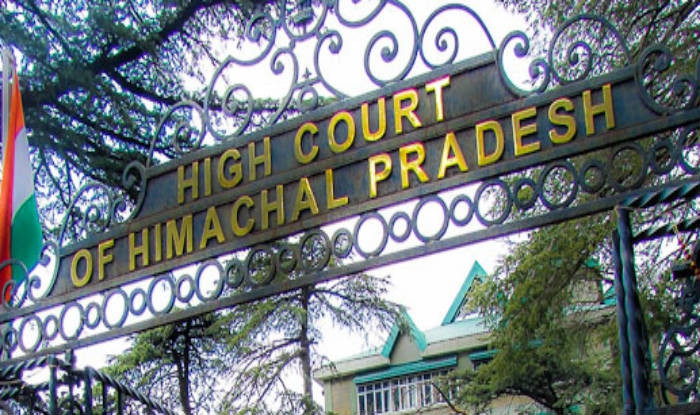Latest News
The Interim Bail is Neither in Contradiction to the Judicial Precedents nor Obstructs Justice’s Path: Himachal Pradesh HC

The Petitioner Ami Chand was accused of the commission of offences punishable under Section 3 of the Scheduled Castes & Scheduled Tribes (Prevention of Atrocities) Act, 1989, known as ‘SCTPOA Act’ in this case Ami Chand v. State of Himachal Pradesh.
In order to surrender himself and simultaneously release on interim bail, the Petitioner-accused approached the Court for seeking permission under Section 439 of the Code of Criminal Procedure. However, instead of accepting the request of the Petitioner, the Court stayed the arrest for further investigations.
The provision of ‘Untouchability’ has been abolished from India and the practice of any such demonstration is forbidden under Article 17 of the Constitution of India which guarantees ‘Untouchability’ shall be an offence punishable in accordance with the law. Apart from this, the parliament enacted the Protection of Civil Rights Act, 1955, and for more stringent law, the Scheduled Castes & Scheduled Tribes (Prevention of Atrocities) Act, 1989.
Section 18 and 18-A of the SCTPOA Act, 1989 states that,“nothing in Section 438 of the CrPC shall apply concerning any case involving the arrest of any person on an accusation of having committed an offence under this act”.
In this case, the question arises whether the accused surrendering himself in the court can seek permission for interim-bail under Section 439 CrPC, if he has been accused of committing offences under Section 3 of the SCTPOA Act, 1989.
From the precedents laid down earlier, different views can be derived out of this issue. It was observed by the three-judge bench of the Supreme Court that Section 438 of CrPC shall not apply to the cases under Section 18 of this Act, however, this bar created by section 18 shall not apply to the cases when the complaint does not make prima facie case(Prathvi Raj v. Union of India, AIR 2020 SC 1036).
The Court in this case observed that the exercise of power by the magistrate in granting bail to a person alleged in an offence should not only be confined to the cases in which good prima facie ground can be made out but also, the cases in which refusal of bail to the arrested person will end the objective of providing justice and will eventually make the petitioner suffer from irreparable harm.
The Court is of the opinion that the accused cannot be granted bail by any High Court or Subordinate Court if he has not been arrested or detained in custody or brought before them. Even, the bail cannot be granted if a warrant of arrest or an order in writing for his arrest has not been issued against him under Section 56 of CrPC.
The mere fact that a report of cognizable offence against the accused has been made to the police and he was arrested by the Officer-in-charge of the police station without a warrant does not empower the court to grant him the bail.
However, the Court accepted the decision held in Amravati’s case(Amaravati v. State of Uttar Pradesh, 2005 Crl.L.J 755), that in appropriate cases interim bail should be granted when the application of final bail is pending and not disposed of because the arrest and detention of a person can cause irreparable loss to the person’s reputation.
When a person is denounced as an accused under Section 3 of the SCSTPOA Act, 1989, then SHO can file a police report without arresting the accused and he can just intimate the accused to appear before the concerned court and hence, not bound to get custody of the accused.
However, when a person seeks surrender and simultaneously pray for interim bail by appearing before a magistrate under Section 437 of CrPC, the power of the Session Court and the High Court related to SCSTPOA Act, 1989 remain untrimmed because, under Section 14 of the Act, the offences are exclusively triable by Special Courts, which shall be the Court of Sessions but while exercising powers under sections 438 & 439 CrPC, the relevant provisions of Section 437 CrPC are imported by both courts.
In this case, the magistrate could not put them into lock-up in the light of the fact that police have not shown any desire to arrest them till now and certainly there was no warrant outstanding. This implies that the magistrate could certainly let them go but then they themselves wanted to be on bail voluntarily or police wanted which means that this made them come directly to the magistrate for getting bail.
The Court is of the view that, “Before accepting surrender, the concerned court must satisfy the existence of the accused’s involvement in the commission of a non-bailable offence”.
In case of any doubt, then the court can confirm it with the Public Prosecutor through any means and can form a prima facie opinion to accept, reject, or postpone the surrender. The status of the accused person is free when the accused approached the court for surrendering voluntarily and the court is making up the mind to accept surrender or not.
From all the above observations, it is concluded that in the present case, the petitioner-accused surrender before the court concerned and makes a prayer for award of interim bail pending final disposal of the bail application, the equivalent shall be considered and decided on the same day.
The interim bail is neither in contradiction to the judicial precedents nor obstructs Justice’s path, Thus, resorting to Section 439 of CrPC and surrendering before Sessions Court or High Court and simultaneously obtaining ad-interim bail does not amount to bypassing and limitations placed in Section 18 and 18-A of SCSTPOA Act, 1989.
This practice of the accused surrendering and getting interim bail cannot be said to override the legislative intention of restraining the anticipatory bail to the violators of the said Act.
Document:



































































































